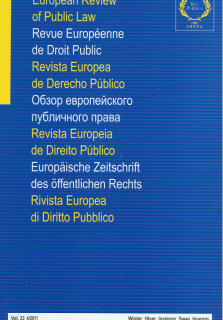
Constitutional Law / Droit constitutionnel
SERBIA / SERBIE
JELENA JERINIĆ
Lecturer at the Union University Law School in Belgrade
This chronicle on the developments in the field of constitutional law in Serbia in 2011 focuses on the operation of the Serbian Constitutional Court. During this year, the Court has passed the first decision on the merits in a case concerning the banning of an extremist organisation. The text outlines the basic features of constitutional and legislative regulation of this topic and tries to point out certain inconsistencies, which could cause difficulties in practice, in future deliberations of the Constitutional Court in similar cases. Based on the two decisions passed in cases of the proposed banning of several extremist organisations, certain important questions have been underlined and the answers to them could constitute a solid basis for establishing consistent case law in these matters. The chronicle also touches upon an interesting decision of the Court on a constitutional complaint submitted by the organisers of the Belgrade Pride Parade, adopted in December 2011, which is in a certain way connected to the Court's case law on banning extremist associations. Finally, it provides a very short overview of the recent amendments of the Law on the Constitutional Court.
Cette chronique relative aux développements intervenus dans le domaine du droit constitutionnel en Serbie en 2011 se concentre sur l'action de la Cour constitutionnelle serbe. Durant cette année, la Cour a rendu la première décision au fond dans une affaire relative à l'interdiction d'une organisation extrémiste. La chronique expose brièvement les caractéristiques fondamentales de la réglementation constitutionnelle et législative sur le sujet et tente de pointer certaines incohérences susceptibles de poser problème dans la pratique, lors de délibérations futures de la Cour constitutionnelle dans des cas similaires. Sur la base des deux arrêts rendus dans des cas de proposition d'interdiction de plusieurs organisations extrémistes, certaines questions importantes ont été soulignées, et la réponse à celles-ci pourrait offrir une base solide pour établir une jurisprudence cohérente en la matière. La chronique aborde également un arrêt intéressant de la Cour concernant une plainte constitutionnelle introduite par les organisateurs de la Gay Pride de Belgrade, rendu en décembre 2011, lié d'une certaine manière à la jurisprudence de la Cour relative à l'interdiction des organisations extrémistes. Enfin, elle présente un bref aperçu des récents amendements de la Loi relative à la Cour constitutionnelle.





















